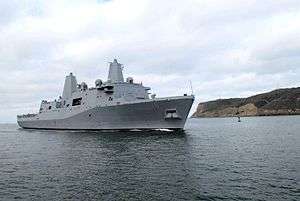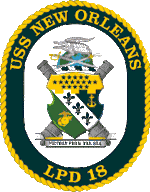USS New Orleans (LPD-18)
 | |
| History | |
|---|---|
| Name: | USS New Orleans |
| Namesake: | The City of New Orleans, Louisiana |
| Ordered: | 18 December 1998 |
| Builder: | Northrop Grumman Ship Systems |
| Laid down: | 14 October 2002 |
| Christened: | 20 November 2004 |
| Launched: | 11 December 2004 |
| Commissioned: | 10 March 2007 |
| Homeport: | Naval Base San Diego |
| Motto: | Victory From the Sea |
| Status: | in active service |
| Badge: |
 |
| General characteristics | |
| Class and type: | San Antonio-class amphibious transport dock |
| Displacement: | 24,433 tons full |
| Length: |
|
| Beam: |
|
| Draft: | 7 m (23 ft) |
| Propulsion: | Four Colt-Pielstick diesel engines, two shafts, 40,000 hp (30,000 kW) |
| Boats & landing craft carried: | Two LCACs (air cushion) or one Landing Craft Utility (conventional) |
| Armament: |
|
USS New Orleans (LPD-18), a San Antonio-class amphibious transport dock, is the fourth commissioned ship of the United States Navy to be named for the city of New Orleans, Louisiana. It is designed to be able to deliver a fully equipped battalion of 700 Marines.
Construction and commissioning
New Orleans is the second vessel in the LPD-17 class of high-tech amphibious assault ships, which ferry Marines and their equipment to and from war zones. The contract to build it was awarded on 18 December 1998 to Northrop Grumman Ship Systems of New Orleans, Louisiana, and its keel was laid down on 14 October 2002. The ship was christened on 20 November 2004, sponsored by Carolyn Shelton, the wife of General Henry H. Shelton, former Chairman, Joint Chiefs of Staff. The warship was actually launched three weeks later, on 11 December. The ship completed its Builder's Trials on 26 October 2006.
New Orleans was commissioned on 10 March 2007 in New Orleans, Louisiana, two years behind schedule and 90 percent over budget.[1] After commissioning, it steamed to San Diego, California via the Panama Canal to join the US Pacific Fleet. The ship arrived at her new homeport of Naval Base San Diego on 3 May 2007 and was assigned to Amphibious Squadron Five.[2][3]
Fielding and issues
After arriving in San Diego, New Orleans required 400,000 more man-hours of construction to bring it to fully operational status. Commander Scott Davies took command of the ship in June 2008.[1] In August 2008, the ship failed its INSURV inspection. The INSURV inspectors documented 2,600 deficiencies, including problems with the steering system, broken ventilation fans, inoperable elevators, corrosion on the flight deck, and an unreliable propulsion system. "USS New Orleans was degraded in her ability to conduct sustained combat operations," the INSURV report said. "The ship cannot support embarked troops, cargo or landing craft."[1] US Navy officials reported that 85% of the deficiencies were minor issues and that most of the deficiencies had already been corrected.
On 9 January 2009, New Orleans departed San Diego on its initial deployment, as part of a five-ship amphibious strike group that also included USS Boxer and USS Comstock. The Boxer strike group and the 13th Marine Expeditionary Unit included more than 4,000 sailors and Marines.[4]
Collision with USS Hartford
| Wikinews has related news: Two US Navy vessels collide in the Strait of Hormuz; 15 lightly injured |
On 20 March 2009 New Orleans was involved in a collision with the submarine USS Hartford (SSN-768) in the Strait of Hormuz. Fifteen sailors on Hartford suffered minor injuries and the fuel tank on New Orleans was ruptured causing an oil spill of 25,000 gallons of diesel marine fuel. After the incident both vessels were able to continue under their own power.[5]
References
- 1 2 3 Liewer, Steve (1 October 2008). "Troubles in port, at sea weigh down Navy ship". San Diego Union-Tribune. Retrieved 2008-01-02.
- ↑ Brandenburg, David A. (2007-05-04). "New Orleans Arrives At Homeport San Diego". Navy Newsstand. Retrieved 2007-09-22.
- ↑ "LPD-17 SAN ANTONIO Class". Global Security.org. 2006-07-28. Retrieved 2007-09-22.
- ↑ Fuentes, Gidget (2009-01-13). "13th MEU departs San Diego for deployment". Marine Corps Times. Retrieved 2009-08-18.
- ↑ "Two U.S. Navy Vessels Collide in the Strait of Hormuz". Commander, US Fifth Fleet. 20 March 2009. Retrieved 2009-03-20.
External links
| Wikimedia Commons has media related to USS New Orleans (LPD-18). |
- New Orleans Official Command Website
- USS New Orleans in the Naval Vessel Register
- "US navy vessels collide in Gulf" (News Report). BBC News. 20 March 2009. Retrieved 2009-03-20.